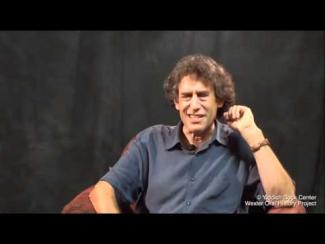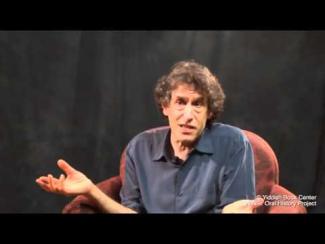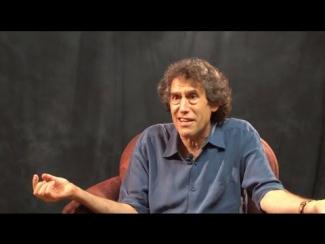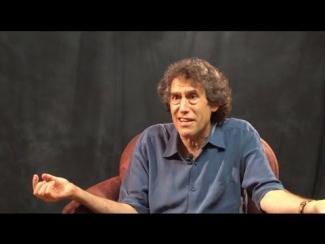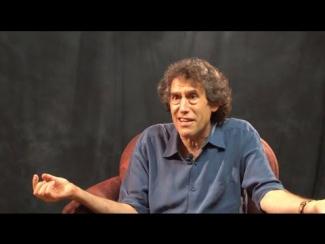The Yiddish Book Center's
Wexler Oral History Project
A growing collection of in-depth interviews with people of all ages and backgrounds, whose stories about the legacy and changing nature of Yiddish language and culture offer a rich and complex chronicle of Jewish identity.
Hankus Netsky's Oral History
Hankus Netsky - ethnomusicologist, founder of the Klezmer Conservatory Band, and Chair of Contemporary Improvisation at the New England Conservatory in Boston - was interviewed by Nora Feinstein on July 8, 2010 at the Yiddish Book Center in Amherst, Massachusetts. Hankus was born in 1955 in Philadelphia, Pennsylvania, and grew up there in the middle-class Mt. Airy neighborhood. His father's family immigrated from Podolia, Ukraine, and his mother's family came from Kishinev in what is now Moldova. His father's family was in the fabric business, the "rag trade," and his mother's family members were musicians. Though his family didn't live in a particularly Jewish neighborhood, they were involved in the local synagogue and Hankus gravitated toward the comforts of Hebrew school more than to public school. Hankus describes beginning to play music as a natural outgrowth of his family background. He was drawn to older forms of music and began playing in bands at synagogue, his first professional gig being at the nearby Hasidic shul (synagogue) for its celebration of a Torah donation. He speaks of an awareness, even as a child, of Yiddish culture that is being supplanted by the introduction of modern Hebrew instruction and Israel as a cultural centerpiece in Jewish life. His education at Hebrew high school opened up possibilities for him, exposing him to powerful examples of Yiddish culture and music, leading him to study Yiddish. As he became more involved and proficient in jazz, Hankus describes his growing awareness that there was no outlet for the Jewish music scene; it was disappearing from Jewish weddings and was dying out in performance. He held on to the idea that his Jewishness needed expression through music. He describes a cathartic moment in his teens while attending music camp; in hearing the lines of a Bertolt Brecht play – "I feel like a man who carries a brick around to show the world what his house was like" – he made a commitment to rebuild Jewish music. He further describes reconnecting with an uncle who connected him to Old World klezmer primary sources and recordings. Hankus talks about teaching improvisation at the New England Conservatory in the late 1970s, in an open stylistic environment, which gave him the freedom to explore and teach klezme and in turn helped spark the klezmer revival movement. He talks of finding inspiration in attending an Irish céilidh (caleigh) and wanting to replicate that experience with Yiddish klezmer. He speaks of concertizing at the Conservatory to an enthusiastic public reception of the music, the forming of the Klezmer Conservatory Band, and the development of klezmer as a living art form. He brought klezmer into the classroom as well as to the concert stage and recording studio. He describes how his musical experience led him to reconnect to Jewish education to provide context for the music. He found the power of music in regaining and reconstructing a cultural identity that was rich in and of itself. He describes the rise of KlezKamp, workshops, and the beginnings of a community of common interest. Hankus talks about developing his skills in conversational Yiddish and his connection to the Yiddish Book Center as a living cultural "home." He concludes by describing how playing concerts is about seeking out older people, performing as a learning experience, and that young people who perform klezmer should think of themselves as students seeking out the culture and building upon it. He talks about the importance of intergenerationality and that oral tradition is a key component of Jewish culture. For him, the Yiddish Book Center has become a cornerstone of rebuilding culture. He feels that this cultural revival came about as a grassroots, countercultural movement to rebuild and that the mainstream is starting to follow that lead. Initial: Hankus Netsky, musician, folklorist, ethnomusicologist, and Chair, Contemporary Improvisation at the New England Conservatory in Boston, was interviewed by Nora Feinstein on July 8, 2010 at the Yiddish Book Center in Amherst, Massachusetts. Hankus was born in 1955 in Philadelphia, and grew up there in the middle-class Mt. Airy neighborhood. His father's family immigrated from Podolia, Ukraine, and his mother's family came from Kishinev in what is now Moldova. His father's family was in the fabric business, the "rag trade," and his mother's family were musicians. Though his family didn't live in a particularly Jewish neighborhood, they were involved in the local synagogue and Hankus gravitated toward the comforts of Hebrew school more than to public school. Hankus describes beginning to play music as a natural outgrowth of his family background. He was drawn to older forms of music and began playing in bands at synagogue, his first professional gig being at the nearby Hasidic shul for its celebration of a Torah donation. Even as a child he speaks of an awareness of Yiddish culture that is being supplanted by the introduction of modern Hebrew instruction and Israel as a cultural centerpiece in Jewish life. His education at Hebrew high school opened up possibilities for him, exposing him to powerful examples of Yiddish culture and music, leading him to study Yiddish. As he became more involved and proficient in jazz, Hankus describes his growing awareness that there was no outlet for the Jewish music scene; it was disappearing from Jewish weddings and was dying out in performance. He held on to the idea that his Jewishness needed expression through music. He describes a cathartic moment in his teens while attending music camp; in hearing the lines of a Bertolt Brecht play – "I feel like a man who carries a brick around to show the world what his house was like" – he made a commitment to rebuild Jewish music. He further describes reconnecting with an uncle who connected him to Old World klezmer primary sources and recordings. Hankus talks about teaching improvisation at the New England Conservatory in the late 1970s, in an open stylistic environment, which gave him the freedom to explore and teach klezmer, which in turn helped spark the klezmer revival movement. He talks of finding inspiration in attendance at an Irish céilidh (caleigh) and wanting to replicate that experience with Yiddish klezmer. He speaks of concertizing at the Conservatory to an enthusiastic public reception of the music and the forming of the Klezmer Conservatory Band and the development of klezmer as a living art form. He brought klezmer into the classroom as well as the concert stage and recording studio. He describes how his musical experience led him to reconnect to Jewish education to provide context for the music. He found the power of music in regaining and reconstructing a cultural identity that was rich in and of itself. He describes the rise of klez camp, workshops, and the beginnings of a community of common interest. Hankus talks about developing his skills in conversational Yiddish and his connection to the Yiddish Book Center as a living cultural "home." He concludes by describing how playing concerts is about seeking out older people, performing as a learning experience, and that young people who perform klezmer should think of themselves as students to find the culture and build on it. He talks about intergenerationality and the oral tradition as a key component of Jewish culture. For him, the Yiddish Book Center has become a cornerstone of rebuilding culture. He feels that this cultural revival came about as a grassroots, countercultural movement to rebuild and that the mainstream is starting to follow that lead.
This interview was conducted in English.
Hankus Netsky was born in Philadelphia, Pennsylvania in 1955.

